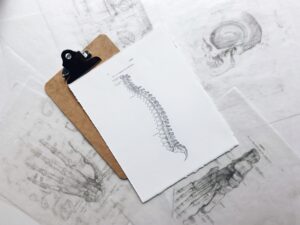Research indicates that only 10 to 20 percent of the population never experiences back pain. For the other unlucky 80 to 90 percent, the phenomenon can be a nuisance at best and frightening at worst. Most back pain subsides over time. But if your back pain is interfering with your quality of life or doesn’t improve after several weeks, a medical evaluation might be necessary.
The back is an extremely complex part of the body, and there are dozens of different reasons why you might be experiencing pain. Your spinal cord is made up of nerves that receive and transmit signals from branching peripheral nerves. It’s protected by your spine itself, which is made up of flexible vertebrae cushioned by discs. These structures are supported by muscles and tendons.
The first question is where the pain is originating from. Some causes of pain have more concerning implications than others. Pain in the lower back is often caused by poor posture when standing at a retail counter or sitting in an office chair. Pain in the shoulders and back of the neck is often related to muscle tension. But pain might also be caused by problems with your joints, your vertebrae themselves, your cushioning discs, or your nerves.
If you’re not sure where your back pain is coming from, but it’s getting steadily worse over time with no hint of getting better, that’s an alarm signal that it’s time to see a doctor. Increasing pain indicates that something is causing progressive damage, whether that’s an infection or growth or illness.
Otherwise, follow these at-home treatment steps first:
- Take ibuprofen or acetaminophen to relieve the pain
- Apply ice intermittently to the sore area
- Don’t languish in bed
- Engage in mild, healthy exercise without overdoing it
If the pain continues after multiple weeks, it’s time to talk to your doctor. Talk to your doctor sooner if you find yourself experiencing:
- A fever indicating infection
- Back pain following a blow or injury
- Impaired bowel or bladder function
- Sudden weakness anywhere in the body
- Inexplicable weight loss
- Symptoms associated with any conditions you have heightened risk factors for like infections, spinal fractures, cancer, etc
Can a Chiropractor Evaluate My Back Issues?
A chiropractor is a healthcare professional specializing in treating the body through physical manipulation. Many chiropractors focus mainly on the spine and any issues therein. You might find that seeing a chiropractor takes less time than waiting to make an appointment with a specialist. In fact, some chiropractic clinics allow same-day walk-ins.
Chiropractors perform many of the same examination procedures that all healthcare providers offer. There are three pieces of the exam:
- Consultation to describe the pain
- Patient history
- Physical exam
It’s the same basic procedure you can expect in your GP’s office.
During the consultation, the chiropractor will gather the following information:
- Frequency and length of the symptoms
- Symptom descriptions
- Exact areas experiencing pain
- Self care remedies and physical positions that relieve the pain
- Movements, activities, and circumstances that worsen the pain
This gives them a sense of the physical issues happening, so they can begin to formulate a theory or decide on what questions need answering. During the case history, the patient will provide:
- Family health history
- Lifestyle and diet information
- Past medical and holistic treatment experiences
- Occupation and living situation
- Answers to questions the chiropractor has based on the gathered information
During the physical examination, the chiropractor might employ different methods to determine the issues and function of your back. They may use motion and static palpitation to see whether any of your spine has a restricted range of motion.
They will then either make a diagnosis and treatment recommendation based on what they’ve observed, or they’ll suggest further diagnostic tests. One common test would be a spinal X-ray to get a better look at the altered vertebra. Another diagnostic tool used by chiropractors is a temperature reader that can locate areas of unusual heat within the back that require spinal manipulation.
The preliminary consultation will not involve any intense spinal manipulation, but the chiropractor may recommend it as a treatment.
If you’re ready to take the first step toward feeling better, we’re here for you. Give us a call at 205-637-1363.








